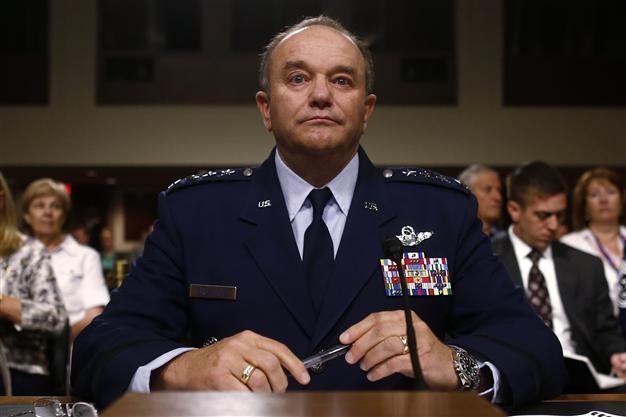NATO gets new supreme commander
BRUSSELS - Agence France-Presse

U.S. Air Force Gen. Philip Breedlove testifies on Capitol Hill in Washington, Thursday, April 11, 2013, before the Senate Armed Services Committee hearing on his nomination to be Commander of the United States European Command and Supreme Allied Commander. AP photo
Four-star US General Philip Breedlove assumed command of NATO Monday, promising to bolster the 28-member military alliance as it prepares for a difficult withdrawal from Afghanistan next year.
Breedlove, 57, formally took over from US Admiral James Stavridis as Supreme Allied Commander Europe (SACEUR) at a ceremony in Mons, southern Belgium, presided over by NATO head Anders Fogh Rasmussen.
By tradition, the US-led alliance is commanded by an American officer and Breedlove is the 17th to do so. Breedlove was nominated in March after John Allen, commander of NATO forces in Afghanistan, dropped out when he was linked to a scandal which brought down CIA head David Petraeus who had also led the Afghanistan mission.
"My first and enduring priority will be to ensure that NATO remains vigilant and prepared to meet the challenges and threats of the future with agile, capable, and interoperable military forces," Breedlove said.
"Within the borders of our Alliance we enjoy unprecedented levels of stability but beyond our frontiers there is uncertainty and insecurity," he said.
Breedlove assumes command as NATO hands over the lead combat role in Afghanistan to local troops ahead of its withdrawal by the end of 2014, when a small contingent will remain behind to provide training and advice.
Rasmussen separately told reporters that NATO member Turkey had not asked the alliance for help after a bomb attack in a village near its border with Syria left 48 dead and more than 100 injured "I strongly condemn this attack," Rasmussen said.
NATO has deployed Patriot anti-missile batteries along the border at Turkey's request after shelling late last year caused casualties in other Turkish villages.
NATO insists the deployment is purely defensive and that it has no intention of intervening in the Syrian conflict.
